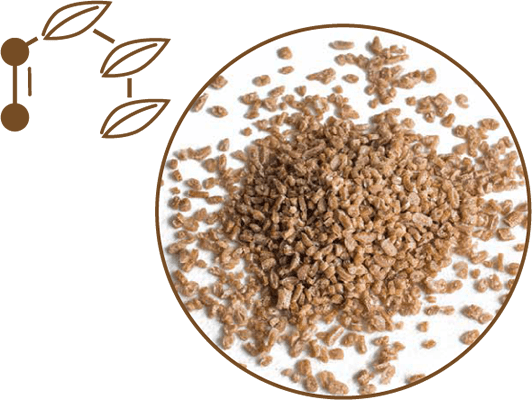
AirX Coffee Bio Composite

BIO-BASED MATERIALS
EU signs ban on disposable plastics in 2021

Plastic bags must contain at least 50% natural material
(Directive (EU) 2015/720)
Australia bans disposable plastics
Plastic bags must contain at least 40% natural material
(Directive (EU) 2015/720 and approved in Italy)
EU bans disposable plastics
The plastic bag must contain at least 60% natural material
(French Decree 2016-379, Article D543-296)
Development and development to use new and eco-friendly
materials Switching is happening all over the world

Global production capacity of bio-based materials in 2020
Global production potential for biomaterial forecasts
2019-2025
Total:2.11 million tons
● Asia
● Europe
● North America
● South America
● Australia
Compound annual
growth rate
source:European Bioplastics,nova-Institute(2020)
Biopolymer is a leader in the manufacture and development of environmentally friendly materials
■ Flexible to change to meet all market needs
■ Product development that meets customer needs

Research
Test
Result
Reduced plastic usage
Health and environmental safety
Reduce CO2 and GHG emissions
Conversion to renewable energy sources
Reduced fossil fuel dependence
Offering products at low prices
Bio-based
Materials

Coffee residuePP/PE/PLABio-based Materials
Coffee biocomposites are made by combining coffee grounds with PP/PE/PLA resins, etc., and PLA-based biocomposites are converted into carbon dioxide, water and biomass under certain conditions. 51% coffee biocomposite can be disposed of as combustible waste.
*Ingredients other than PLA are naturally decomposed by approximately 25% using our own patented technology.
*PP is 100% decomposed into water and carbon dioxide when incinerated, and does not pollute the environment.

Bio-based certificate
(60-80% bio-based material)

Bio-based certificate
(50-85% bio-based material
And biodegradability)

International quality certificate

Health and safety
International quality certificate

Bio-based material certificate

Bio-based certificate
(60-80% bio-based material)

ROH and REACH certificate
Meets all standards and conditions for export to Europe and America.
 Natural materials
PP/PE/PLA
Bio-based materials
product
Carbon dioxide + methane + water + biomass
Carbon dioxide + water + biomass
bury
burn
Natural materials
PP/PE/PLA
Bio-based materials
product
Carbon dioxide + methane + water + biomass
Carbon dioxide + water + biomass
bury
burn
Coffee biocomposites are made by combining coffee grounds with PP/PE/PLA resins, etc., and PLA-based biocomposites are converted into carbon dioxide, water and biomass under certain conditions. 51% coffee biocomposite can be disposed of as combustible waste.
*Ingredients other than PLA are naturally decomposed by approximately 25% using our own patented technology.
*PP is 100% decomposed into water and carbon dioxide when incinerated, and does not pollute the environment.
 Bio-based materials
Blow molding
Plastic molding process
Injection molding
Packaging
Building materials
Household goods and industrial products
Bio-based materials
Blow molding
Plastic molding process
Injection molding
Packaging
Building materials
Household goods and industrial products
 Coffee biocomposite
60% coffee grounds + 40% PP
■ To maintain the quality of the product, use it in an environment
Coffee biocomposite
60% coffee grounds + 40% PP
■ To maintain the quality of the product, use it in an environment where the temperature is below 170°C.
EU signs ban on disposable plastics in 2021
 Plastic bags must contain at least 50% natural material
Plastic bags must contain at least 50% natural material(Directive (EU) 2015/720)
 Australia bans disposable plastics
Australia bans disposable plastics
 Plastic bags must contain at least 40% natural material
Plastic bags must contain at least 40% natural material(Directive (EU) 2015/720 and approved in Italy)
 EU bans disposable plastics
EU bans disposable plastics The plastic bag must contain at least 60% natural material
The plastic bag must contain at least 60% natural material(French Decree 2016-379, Article D543-296)
Development and development to use new and eco-friendly
materials Switching is happening all over the world
Global production capacity of bio-based materials in 2020

2.11 million tons
● Asia
● Europe
● North America
● South America
● Australia
Global production potential for biomaterial forecasts
2019-2025

source:European Bioplastics,nova-Institute (2020)
Compound annual
growth rate
Biopolymer is a leader in the manufacture and development of environmentally friendly materials
■ Flexible to change to meet all market needs
■ Product development that meets customer needs
 Research
Research
 Test
Test
 Result
Result








Coffee residuePP/PE/PLABio-based Materials
Coffee biocomposites are made by combining coffee grounds with PP/PE/PLA resins, etc., and PLA-based biocomposites are converted into carbon dioxide, water and biomass under certain conditions. 51% coffee biocomposite can be disposed of as combustible waste.
*Ingredients other than PLA are naturally decomposed by approximately 25% using our own patented technology.
*PP is 100% decomposed into water and carbon dioxide when incinerated, and does not pollute the environment.

Bio-based certificate
(60-80% bio-based material)

Bio-based certificate
(50-85% bio-based material
And biodegradability)

International
quality certificate

Health and safety
International
quality certificate

Bio-based material
certificate

Bio-based certificate
(60-80% bio-based material)

ROH and REACH certificate
Meets all standards and conditions for export to Europe and America.
 Natural materials
PP/PE/PLA
Bio-based materials
product
Carbon dioxide + methane + water + biomass
Carbon dioxide + water + biomass
bury
burn
Natural materials
PP/PE/PLA
Bio-based materials
product
Carbon dioxide + methane + water + biomass
Carbon dioxide + water + biomass
bury
burn
Coffee biocomposites are made by combining coffee grounds with PP/PE/PLA resins, etc., and PLA-based biocomposites are converted into carbon dioxide, water and biomass under certain conditions. 51% coffee biocomposite can be disposed of as combustible waste.
*Ingredients other than PLA are naturally decomposed by approximately 25% using our own patented technology.
*PP is 100% decomposed into water and carbon dioxide when incinerated, and does not pollute the environment.
 Bio-based materials
Blow molding
Plastic molding process
Injection molding
Packaging
Building materials
Household goods and industrial products
Bio-based materials
Blow molding
Plastic molding process
Injection molding
Packaging
Building materials
Household goods and industrial products

Coffee biocomposite
60% coffee grounds + 40% PP
an environment where the temperature is less than 170°C.

Coffee Bio-composites
We also wholesale raw
materials to companies
that have manufacturing technology.
We can adjust the blend ratio of coffee
grounds, and even provide bio-composites
with PLA specifications to meet your needs.
Please feel free to contact us.













